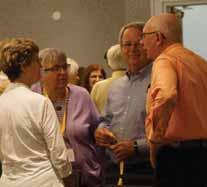







The magazine of U.S. Mennonite Brethren

HEATH HOLLENSBE
DAVID FABER









The magazine of U.S. Mennonite Brethren

HEATH HOLLENSBE
DAVID FABER
We recently visited a Kansas state lake, and as we hiked the trails my husband used an app on his smart phone to identify the various wildflowers. “I wonder what that is,” one of us would say, and David would take a picture and within seconds the app would provide the name and basic information for the yellow, pink and purple flowers that caught our eye. One plentiful plant we encountered more than once prompted a slightly different question: “I wonder what poison ivy looks like?” Thanks to the plant identifier app, we learned that the five-leafed plant was Virginia Creeper, a variety sometimes mistaken for poison ivy, which has three leaflets.
of the


This issue of the CL addresses a question similar to the one we asked during our hike: What does a follower of Jesus look like? Our feature articles highlight the description given in Galatians 5. Here the apostle Paul says that when the Holy Spirit guides our lives, the fruit of the Spirit—love, joy, peace, patience, kindness, goodness, faithfulness, gentleness and self-control—will be evident in us (Galatians 5:16, 22-23, NLT). The nine attributes listed in Galatians are not an exhaustive list. According to Description of a Growing Disciple, a resource brochure published by the Canadian Conference of MB Churches, the New Testament alone alludes to over 600 behaviors and attitudes that describe a maturing Christian, and the MB Confession of Faith mentions more than a dozen of these descriptors.
Helping churches become communities that intentionally grow disciples is one of three core commitments USMB adopted six years ago as part of its national ministry vision. Discipleship is a life-long process that transforms our hearts. To quote from Description of a Growing Disciple, “Discipleship is choosing to be with Jesus in order to learn to be like him, in the power that he gives. Discipleship is responding to God’s work in our lives, with his initiative making our transformation possible.”
To help us think about how the fruit of the Spirit can be evident in our lives, we invited USMB pastors and others to reflect on one of the fruit, and six people responded to the invitation. My hope is that these essays will challenge and inspire us to embrace the Holy Spirit’s work in our lives so that we become mature disciples who bear fruit that draws others to Jesus. ◗
Vol. 84, No. 4
July / August 2021
Connie Faber has served as editor of Christian Leader since 2004. She and her husband, David, are members of Ebenfeld MB Church, Hillsboro, Kan.
The Christian Leader (ISSN 0009-5149) is a gathering place for the people, passions and mission of U.S Mennonite Brethren. The Christian Leader is published bimonthly by the U.S. Conference of Mennonite Brethren Churches. However, the opinions expressed here are not necessarily those of the church as a whole.
COPYRIGHT: The articles printed in the Christian Leader are owned by the CL or by the author and may not be reprinted without permission. Unless noted, Scripture quotations are from the New International Version.
READER PARTICIPATION: Letters to the editor are published online (www.christianleadermag.com) and should be 500 words or less and on one subject. Letters must be signed and include the writer’s city and state. Letters will be edited for clarity, appropriateness and length.
SUBSCRIPTIONS: $10 for six issues and $20 for 12 issues ($15, $30 in Canada; all other countries $25 for six issues); $1.50 per copy
CORRESPONDENCE: All correspondence, including subscription questions and address updates, should be addressed to Christian Leader Box 155, 107 N. Main Hillsboro, KS 67063-0155
Phone: 620.947.5543
Email: editor@usmb.org
MEMBERSHIP: The Christian Leader is a member of the Evangelical Press Association and Meetinghouse, an association of Mennonite and Brethren in Christ editors.
POSTMASTER: Send address changes to Christian Leader, Box 155, Hillsboro, KS 67063. Periodicals postage paid at Hillsboro, Kansas.

Tabor College junior Toby Penner completed an internship with the Christian Leader in Spring 2021.
Penner, who in 2021 received the honor and monetary Tabor Kornelius Hiebert Outstanding Student Merit Award in recognition of his academic achievement and demonstrated leadership on campus, is pursuing a major in communications with a minor in English.

This spring, Penner put in about five hours a week for his CL internship, conducting interviews, writing stories for print and online, editing news briefs, formatting obituaries, proofreading and posting on social media, in addition to a weekly meeting with editor Connie Faber.
“Leadership development is one of the USMB core commitments and having the opportunity to work with someone like Toby, who demonstrates leadership in so many areas, is one way we as CL staff can be part of developing the next generation of leaders in the area of communication,” Faber says.
“It’s just been really special to do this,” Penner says. “It’s really going to pay off later. For whoever else comes through, they’ll have my full recommendation for (the CL), as an intern.”
The most recent recipient of Tabor’s “Male Athlete of the Year” award and the school record-holder in the 400meter intermediate hurdles, Penner came to Tabor to run track—he competed at the NAIA Outdoor Track and Field National Championships at the end of May—but his athletic participation only scratches the surface of his involvement on campus.
A 2018 graduate of Berean Academy in Elbing, Kan., Penner balances a full schedule as a student-athlete. In addition to track, Penner plays drums and serves on the leadership team of the student-led worship band SP&D, represents Tabor on the 26-member KCAC Student-Athlete Leadership Team and serves as editor of the campus student publication, The Tabor View. He was a resident assistant in the dorms his sophomore year. —CL
MB Foundation has announced plans for Celebrate 2022! to be held in San Diego, Calif., Feb. 25-27, 2022. This is the fourth national gathering geared for boomers, builders and empty nesters.
Previous Celebrate gatherings in 2015, 2017 and 2019 took place in the Midwest.

“After 2019 we promised to take the event to the West Coast, and we believe the sun and sand will be a great place to invigorate us during February,” says Jon C. Wiebe, president and CEO. “We are excited about bringing people together after months of isolation.”
The every-other-year event was moved to 2022 to allow conditions with the pandemic to stabilize.
Through this event, MB Foundation seeks to encourage and inspire this age group who are looking to invest their lives in new ways.
“We are looking forward to gathering for encouragement, worship and fellowship,” Wiebe says. “Celebrate gatherings are becoming a highlight of our ministry at MB Foundation. Mark your calendars and plan to join us.”
Visit www.mbfoundation.com/celebrate2022 for more information or contact MB Foundation at 800-551-1547.—MBF
Fresno Pacific University held a virtual commencement ceremony May 8 for 945 graduates and their families.
Speaker James Cecy, senior pastor of Campus Bible Church in Fresno, suggested three sources of “hupomone”— a Greek term meaning steadfastness, constancy and endurance—including God, trials and people who have endured challenges.
The ceremony, virtual because of the COVID-19 pandemic, included the announcement of graduates’ names, music and remarks from FPU President Joseph Jones and others. Awards were also announced.
In all, 537 students completed the bachelor’s degree completion program, 227 received master’s degrees (including 37 from Fresno Pacific Biblical Seminary) and 187 earned their bachelor’s degree in the traditional undergraduate program. Graduates who registered were mailed diploma covers, commencement programs and other items they would have gotten at the ceremony and were encouraged to celebrate with family and friends.—FPU
The Tabor College Board of Directors has selected David Janzen to serve as the 14th president of the MB institution in Hillsboro, Kan. Janzen’s appointment will take effect July 1, 2021, succeeding Jules Glanzer, who served as president for more than 13 years.
“We are thankful for the Lord’s leading in the search process and are very excited that Dr. Janzen has accepted our
offer to serve as our next president,” says board chair Susan Franz Koslowsky. “David’s passion for Tabor and his love for the Lord are evident.”
A 1990 graduate of Tabor College, Janzen currently serves as professor and software engineering coordinator in the Department of Computer Science and Software Engineering at California Polytechnic State University in San Luis Obispo, Calif. Janzen has been a full-time faculty member in his current position since 2006 and was promoted to professor in June 2013.
$375,000 was contributed to the COVID-19 Church Relief Fund, helping MB churches maintain their financial stability. An additional $190,654 was distributed to USMB as MBF’s annual first fruits gift.

He was also adjunct faculty in computer science at Westmont College in Montecito, Calif., from August to December 2020. He worked in the software industry with Sprint from 1993-97, then taught at Bethel College from 1997-2006 and the University of Kansas from 1991-93 and 2004-06.
He earned a master’s of science and doctorate in computer science from the University of Kansas.
Janzen is a native of Independence, Kan., and Enid, Okla. He and his wife, Karen, have four adult children.—TC
MB Foundation has released its 2020 annual report, highlighting another year of growth and the celebration of its 30th anniversary of incorporation.
MBF gave its largest grant amount in a single year, totaling $906,118. More than $340,000 was distributed to every church, organization and home loan borrower benefitting 47 home loan and 68 organization borrowers. Another
MBF released Taking Hold of Real Life: The Story of MB Foundation, which recounts the events of the last 30 years and tells the story of stewardship among Mennonite Brethren over the past 140 years.
In its 30-year history, MBF has seen significant asset growth, from $16.9 million in 1990 to $300 million at the end of 2020. The growth in 2020 reflects a 19 percent increase from the previous year.
Additional highlights for 2020 include increased staffing for a total of 21 employees in two offices, the launch of the new Financial Health program, a record number of real estate gifts received, the Loan Portfolio increase to $99 million and an 88 percent increase in charitable distributions from the previous year.
“We experienced amazing generosity, continued growth, record numbers of investors, new projects undertaken and much more,” says Jon C. Wiebe, president and CEO. “We praise God for the positive outcomes to a challenging year.”
The full report is available at www.mbfoundation.com/2020annualreport.—MBF
Tabor College honored 123 undergraduate and graduate students at its 111th commencement May 15.
Speaker Gary Speese, a 1984 Tabor graduate now serving in education, spoke about abundant life and the foundation of interacting with people in the world.
The ceremony included awards presentations, music, student addresses

and a message from Tabor President Jules Glanzer. In all, 92 students completed bachelor’s or associate’s degrees, while 31 earned master’s degrees.—TC
The International Community of Mennonite Brethren has hired Daniela Grimm from Paraguay as executive assistant. Grimm fills the role vacated by Rebekah Doerksen, who resigned in May after eight years of service with ICOMB.
In its announcement, ICOMB affirms the joy Grimm has shown in joining the ICOMB team and commends Doerksen for her “contributions in love, prayer, ideas, suggestions, communications, organization and the many practical jobs she accomplished.”—ICOMB
The Canadian Conference of MB Churches (CCMBC) National Faith and Life Team (NFLT) has decided not to host a conversation on marriage and same-sex intimacy during the CCMBC Annual General Meeting this summer. This comes in response to an open letter circulated in late March 2021 with 517 names requesting a conversation at the national conference level, written after Artisan Church requested release
from the British Columbia Conference of MB Churches following Artisan’s Milestone Statement on LGBTQ+ inclusion. Delegates to the BCMB convention in April voted to grant Artisan’s request to leave the provincial conference.
The open letter states, “As we prepare for upcoming times of gathering and decision-making, we, the undersigned, ask our leaders to create space for us to speak and listen to each other—community to community. We want to ask questions, seek clarification, and speak the truth in love.”
In its response, the NFLT says, “As the NFLT—with MB leaders and pastors representing churches from BC to Nova Scotia—we believe that our present Confession of Faith is faithful to Scripture; but we acknowledge that as an MB family we have often failed to live out our convictions in loving ways.… We believe that the best path forward is for our churches and leaders to affirm and teach what we believe are biblically faithful convictions while at the same time applying them in ways that fit the sacrificial way of Jesus in the world.”
The NFLT also notes that CCMBC’s new collaborative model of governance invites individuals with questions about the Confession of Faith to first process those questions with their provincial conference Faith and Life teams because local and provincial conversations are where “relationships with members and churches are closest, where contexts are best understood and listening can be most effective.”
The NFLT says it is creating new resources providing guidance for how the convictions of its COF on sexuality and marriage can be taught and practiced in churches more compassionately and is also making other resources more accessible on its website.
To read the open letter and NFLT’s response, visit: https://mbherald.com/ an-open-letter-to-mb-church-leaders/.—CL



How did you get your start in running?
Some younger friends of mine were participating in a monthly fun run where runners would find raffle tickets hidden around a local shopping mall. I joined them for the comradery and the exercise and discovered I could do this, and it could be fun. From there I started doing 5K [about 3-mile] runs.
How did you move to half marathons [about 13 miles]?
I never did serious training, just doing several 5K’s a month. One time, I was picking up my 5K runner’s bib the day before a race and my friends said, “Why aren’t you doing a half marathon like we are?” So, I went and traded in my 5K bib for a half marathon. The next day I ran and ended up being third in my age group.
What interesting places have you run?
The furthest I’ve gone was a 5K on the Big Island in Hawaii. One of the more difficult ones was on the San
More than seven years ago, at age 70, Ken Neufeld got a late start at long-distance running. But he has made up for lost time. Now 78 years old, he has run more than 40 half marathons. A member of Willow Avenue Mennonite Church in Clovis, Calif., Ken is a successful realtor in the Fresno market, but is known in the Mennonite Brethren family as an insightful stewardship leader, serving 26 years with the MB Foundation board as well as many terms in his local church and Pacific District Conference stewardship boards.
Pedro Dam in California, with part of the run actually climbing up the wall of the dam. You’re almost running on all fours. And getting down isn’t much easier.
How is the competition?
You just compete against people in your age group. My fastest half marathon was two hours and 29 minutes back in 2016. Three or four years ago I did very well in my age group; now I might get third once in a while. One time I got first, but I was the only entry in my age group. It felt awkward, but the man giving out the awards said I shouldn’t feel bad—the rest of my age group was sitting on the couch.
How much longer will you keep running?
At 78, I’m usually on the old end of the oldest category, but some big races have a category for 80 and over. I’d like to run in that category.
InterviewbyKathyHeinrichsWiest
As a children’s pastor, it seems that there are always questions. Questions from parents. Questions from staff. Questions from leadership. Questions from children. Many questions from children.
Questions can be perplexing, but often the most difficult questions come from my own mind: Should we change curriculum this year? What time should we start our programming? And on it goes.
This year a question came to mind not long after the celebration of New Year’s Eve: What should I give the “Wednesday Kids Night” students for Valentine’s Day?
Chocolate hearts are good, but not all students like chocolate. Not to mention, chocolate melts in your hands and pockets, and it’s not a great snack to give children at 8:00 p.m.
This question may not seem important from the outset, but here is why it is: I have the privilege of seeing 50 to 80 students but only a few minutes a week and usually in a large group setting. I have to make every moment count! This year my decision for their Valentine’s gift would, in part, be sharing the greatest gift of love ever—God’s love to the world.
During our 15-minute Children’s Worship Time I shared how Jesus came to earth as a baby and how he grew and lived until it was his time to give his love to us— to give his life and die for us—to pay the debt for our sins. Then, I pulled a red wristband out of my pocket. On the band was printed John 3:16.
I gave one to each student, with the option to wear it or give it away. The goal was to see if anyone would ask them during the school day, “Hey, what’s that wristband say?” If they were asked, it was a wide-open door for them to be able to share about Jesus’ love for them.
The next Wednesday night a student came to me after Worship Time and said, “Hey, Miss Bev, guess what?”
“What? Did someone ask you about your wristband?” I said.
“Nope,” she replied, “but I told them anyhow!”
Wow! Talk about boldness to witness.
A month later a schoolteacher caught me and told me how good it was to see the red wristbands students were wearing at school. I related to this teacher what one of the students had done. She laughed.
“I know,” she said, “I was that person!”
Teaching children is full of surprises, smiles and blessings. One thing teaching children is not—babysitting.
Barna research has shown that nearly half of Americans that accept Jesus as their Savior do so before reaching the age of 13. When I saw that statistic the first time, I thought to myself, “I really wonder how true that is?” So, I tried it out at our Children’s Ministry Teaching Team meeting. I was amazed to see the show of hands to the question of how old they were when they accepted Jesus as their Savior. The research proved itself to be true in that room.
During my 14 years of teaching children nursery through the 6th grade at Hillsboro MB Church, I have become increasingly passionate about not wasting time that we have with children on Sunday mornings and Wednesday nights. Children come excited and thirsty to hear God’s Word. Let’s not be deceived to think kids want hype, constant games and stimulation. They are coming for what the “world” can’t give them—Jesus’ love, God’s truth, caring relationships, hope.
Children’s ministry is a huge call for evangelism and discipleship. Thank you to all who have answered his call.◗

Bev Vogel has been pastor of children and family ministries at Hillsboro M.B. Church in Hillsboro, Kan., since 2006. She is a graduate of Tabor College where she earned a degree in Business Education and taught business education classes and coached girls basketball at Central Christian High School in Hutchinson, Kan. She also holds a Certificate of Counseling from the American Association of Christian Counselors. Vogel and her husband, Brad, moved to Hillsboro in 1997. They have two married sons and four grandchildren.
Iamin a war, and I am weary. The enemy attacks every day, sometimes in the morning, more often in the afternoon but the deadliest attacks always wait for the evening and nighttime hours.
For many years both the quantity and quality of my sleep have significantly deteriorated. By January of this year, I averaged about two hours of fragmented sleep a night. My level of fatigue was so great that I would doze while eating, talking, sitting, standing, walking, listening, praying, worshiping and driving.
My battles, however, are not limited to overwhelming fatigue. Every day I experience wave after wave of excruciating nerve pain in my lower body. This pain is triggered by the very thing my body so desperately needs—sleep. The sleep that is essential to physical, emotional, relational and spiritual well-being is the door into a torture chamber.
For more than 25 years doctors attempted to control my pain through the use of nerve pain medications. Some have been helpful, but their effectiveness always diminishes over time. Toward the end of 2019 my mystified neurologist referred me to the Mayo Clinic.
In 2020 my wife, Gladys, and I made four extended trips to Mayo. In the beginning we were hopeful because our doctors were determined to discover and treat the cause. After scores of tests and consultations, we were informed that my pain remains an unsolved mystery. Pain management, the very thing that we had been doing for 25 years, was our only option. We wept.
As exhausting and demanding as this war with physical pain and fatigue is, the greatest and most intense battles are spiritual. We are weary with the incessant attacks of fear, doubt, depression, anger, frustration, despair, self-pity and confusion. We grow weary of crying out to our Heavenly Father hour after hour every
day, week after week, month after month, year after year.
“Why do you hide your face and forget our misery and oppression?” Did not Jesus say, “If you, then, though you are evil, know how to give good gifts to your children, how much more will your Father in heaven give good gifts to those who ask him?” So why does God seem to ignore our requests as well as those of hundreds of others who intercede on our behalf?
Why is God’s presence so hidden and his voice so silent? Job 23:8-9 says, “If I go to the east, he is not there; if I go to the west, I do not find him. When he is at work in the north, I do not see him; when he turns to the south, I catch no glimpse of him.”
Here are a few reflections of a bruised and battle-weary child of God who is in the battle, not through the battle.
The cross of Jesus continues to be the true north on my spiritual compass. The God who Jesus questioned (“My God, why have you forsaken me?”) is the very one Jesus entrusted his life to (“Father, into your hands I commit my spirit”). The way toward victory is not based on my ability to fight but in my willingness to surrender.
The cross also reminds me that the greatest revelation of God’s glory and goodness was accomplished through the foolishness of suffering.
The cross also teaches my soul to wait. If my faith in God depended only on the events of the Friday and Saturday of the crucifixion, I can tell you for certain that I would never want to trust in the God who would allow such unjust suffering. Sunday reminds me that I need to be patient if I am to see the good that God intends to accomplish.
See TESTIMONY, page 30
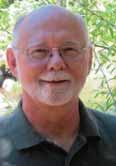
Paul Klassen and his wife, Gladys, moved to Hillsboro, Kan., in 2018 and are members of Hillsboro MB Church.
Klassen is a retired Mennonite Brethren pastor who served congregations in Onida, SD, for eight years and Edmond, Okla., for 29 years. Following Klassen’s retirement, he served as an FBI chaplain for six years. He enjoys doing wood inlay artistic projects in his shop as The Carpenter’s Apprentice.
We produce fruit when we are connected to God’s Spirit
On the eve of his execution, Jesus sat his closest friends down for a long talk. He had much to say but not much time left to say it. As Jesus spoke, his disciples grew afraid. How could they go on without him? How could they possibly continue all alone?
Simple, Jesus said. You won’t be alone. “I am the vine; you are the branches,” he encouraged them. “The one who remains in me and I in him produces much fruit, because you can do nothing without me…. My Father is glorified by this: that you produce much fruit and prove to be my disciples” (John 15:5, 8, HCSB). Connected to the vine, they would bear much fruit for God.
“Bearing fruit” for God is a common figure of speech in the Gospels, starting with John the Baptist, who told the Jewish religious leaders to “produce fruit consistent with repentance,” since “every tree that doesn’t produce good fruit will be cut down and thrown into the fire” (Matt. 3:8, 10). Jesus himself uses the metaphor of producing fruit in the parable of the soils (Matt. 13; Mk. 4; Lk. 8), the parable of the vineyard owner (Matt. 21; Mk. 12; Lk. 20), and the parable of the fig tree (Lk. 13). In each of these stories, fruit is the ultimate goal. Jesus is driving home the point with all these parables: God expects fruit from us. But what exactly does Jesus mean by “fruit”?
Known by our fruit
The sermon on the plain in Luke 6
By David Reed



is helpful here. Jesus says, “A good tree doesn’t produce bad fruit; on the other hand, a bad tree doesn’t produce good fruit. For each tree is known by its own fruit. Figs aren’t gathered from thornbushes, or grapes picked from a bramble bush. A good man produces good out of the good storeroom of his heart. An evil man produces evil out of the evil storeroom, for his mouth speaks from the overflow of the heart” (Luke 6:43–45, HCSB). Fruit is what comes out of our hearts. Does my heart produce figs or brambles?
So, when Paul writes to the Galatian churches and speaks of “fruit of the Spirit,” the metaphor was clear. Our outward behavior that reflects the disposition of our hearts, this is the fruit we bear for God—and it comes from the Spirit. Paul writes, “But the fruit of the Spirit is love, joy, peace, patience, kindness, goodness, faith, gentleness, self-control. Against such
things there is no law” (Gal. 5:22–23, HCSB). This list of nine virtues is not meant to be exhaustive, but a taste of the kinds of things the Spirit can and will produce in us.
Paul’s audience was eager to live virtuous lives for God, but they were misguided about where true virtue comes from. They had been influenced by false teachers who insisted that keeping the Old Testament law (or, at least the primary “signs” of being God’s people—circumcision, Sabbath-keeping and eating kosher) was required of Gentile converts to Christianity. They accepted Jesus as the Messiah but clung to the law as the source of their identity and righteousness.
They may have been motivated by a purely pragmatic point of view. After all, the freedom afforded by the doctrine of complete forgiveness under Christ would amount to “an opportunity for the flesh” (Gal. 5:16, HCSB).
Grace leaves no room for pride; we can take no credit for the fruit.
The Roman church had identified the same “flaw” in the gospel of grace: people, once forgiven, might “continue in sin so that grace may multiply” (Rom. 6:1, HCSB). How are we possibly to resist the desires of the flesh without the law to keep us in check? Paul’s answer is simple: “Walk by the Spirit and you will not carry out the desire of the flesh” (Gal. 5:16, HCSB).
That same night when Jesus said, “I am the vine; you are the branches,” he also repeatedly spoke of the “Spirit of truth,” whom he called “the Counselor” (also translated “Advocate,” “Comforter” or “Helper”). “It is for your benefit that I go away,” Jesus insisted, “because if I don’t go away the Counselor will not come to you. If I go, I will send him to you” (John 16:7, HCSB). It is clear that the Spirit takes up the baton from Christ; it is by the Holy Spirit that the apostles would remain connected to the vine, Jesus.
Led by the Spirit
Paul spends the first four chapters of the book of Galatians making the case for the superiority and sufficiency of faith in Christ to establish our righteousness before God. At the climax of his impassioned plea against being yoked to slavery under the law, he reveals the true key to righteous living: it is not law, but Spirit. “If you are led by the Spirit, you are not under the law” (Gal. 5:18, HCSB). The Spirit will produce in us all the virtues which the law never could. “The fruit of the Spirit is love, joy, peace, patience, kindness, good-
ness, faith, gentleness, self-control. Against such things there is no law” (Gal. 5:22–23, HCSB). By this last phrase Paul means, these virtues exist “in a sphere with which law has nothing to do,” writes F.F. Bruce, in the New International Greek Testament Commentary on Galatians. The law cannot impart these things; the Spirit can and will.
Today, none of us face quite the same situation as Paul’s original audience, but the principles here still have tremendous significance for us. The human heart loves law. A checklist detailing exactly what is expected of us helps us feel (falsely) confident in our standing with God and gives us room to feel pride in our efforts.
But grace—that is hard. Grace forces us to rely on our relationship with God as our assurance of salvation. Grace leaves no room for pride; we can take no credit for the fruit. In the parable of the soils, we are the soil; we are simply called to be hospitable to the word that God will sow.
Most Christians today will agree that we are justified by faith in Christ alone and not by keeping the Old Testament law—but then we turn right around and still live as if we were under law. Deep down we often believe that we earn favor with God when we are pious. We think that exterior rule-keeping makes us good people. We say we live by grace, but too often act as if we still live by law.
The way to grow in the virtues of love, joy, peace, patience, kindness,
goodness, faith, gentleness and selfcontrol will never come through obeying rules. On the contrary, obedience to rules will fool us into thinking we have changed when in reality our heart has not budged. The change has only been superficial.
Only the Spirit can bring true change to our hearts. The Christian life cannot be lived without him. But we cannot be led by the Spirit while still clinging to law. “But now we have been released from the law, since we have died to what held us, so that we may serve in the new way of the Spirit and not in the old letter of the law” (Rom. 7:6, HCSB). Each morning we must reject rule-keeping as the source of our confidence and rely on God’s Spirit (literally, his “breath”) inside of us to lead our way.
“My Father is glorified by this,” Jesus says, “that you produce much fruit and prove to be my disciples.” This is true for us as much as for the 12 disciples—we prove our discipleship by the fruit we bear. The world is watching; our response must not be from our own effort, but from the Spirit working inside of us.
David Reed has served since 2016 as an elder at North Park Community Church, a USMB congregation in Eugene, Oregon. He currently serves as the council chair. He received his masters of divinity from Western Seminary in Portland, Ore., and his masters of philosophy from Bushnell University in Eugene. Reed is a stay-at-home dad for his 7-year-old son. Scriptures quoted in this essay are from the Holman Christian Standard Bible.







God’s story is always one of joy
What child has not been coaxed to eat their carrots with, “They will give you good eyesight!”
Have you considered that the fruit of the Spirit we call “joy” can improve your spiritual eyesight? Consider this story.
When Gerald Coffee was a prisoner of war during the Vietnam War, he and his fellow prisoners were given candy bars at Christmas. The foil around the candy was red on the outside and silver on the inside. Coffee shaped one piece of foil into a swan. The second he folded into tight little pleats. He tied the pleats in the center with a thread and fanned the edges to make a rosette. The remaining piece of foil ended up looking like a star. How fitting, he thought, the star of Bethlehem. He pulled three straws from the broom in his cell, attached the ornaments and jammed the straws into a crack in the cell wall. He sat back and watched them reflect light from the single bulb in his cell.
It was Christmas and Coffee thought about Christ’s birth and what it meant to his life. Slowly it dawned on him that as lonely as he was, frightened and hurting, this was one of his most significant Christmas moments.
Have you known that kind of joy? Have you tasted the joy that seeps into your soul when everything around you seems wrong, yet in your heart everything seems right? I suggest that is a unique joy that can only be known in Christ.
Thinking of this reminds me of the paradox that unfolded in the Palestine village of Bethlehem when Christ was born.
■ The nation of Israel lived under Roman oppression.
■ Roman rulers, the Caesars, would soon declare themselves gods, deity to be worshiped.
■ Mary and Joseph were some of the poorest in the land, peasants really.
■ Mary’s pregnancy was unexpected, embarrassing and certainly confusing.
■ Travel during Mary’s pregnancy was risky and the timing unfortunate.
■ Accommodations in Bethlehem were disappointing, even disgusting.
And into that miserable setting, an angel announced to lowly shepherds, “I bring you good news of great joy!”
Our book of joy
Joy! How out of place it must have sounded at Christ’s birth, yet it reminds us that in the end, God’s story is always one of joy. His book, our Bible, is a book of joy. In the Jewish encyclopedia there are 27 different words that express some aspect of joy. One is connected to an image of something bright and shining while another means to leap and jump. One of the words for joy refers to shouting while another refers to someone running around in a circle. For the Hebrew people, joy was a powerful and many-sided idea.
The New Testament is hardly different from the Old Testament as John Drescher writes, “Although the New Testament centers on the cross, is bathed in the blood of the martyrs and filled with the fires of persecution, a note of triumphant joy rings throughout. ‘Joy,’ ‘joyful’ or ‘rejoice’ are found more than 160 times in the New Testament, and the connection to Jesus and joy is profound:



By Dennis Fast

In a world of darkness, he came as light. In a world of despair, he came as hope. In a world of doubt, he came to give faith. In a world of disappointment, he brought joy!”
Do you know the joy of the Lord—the kind announced at his birth? If your situation is remotely like that of Mary and Joseph, with so many things wrong and the odds against you, then you, my friend, are a candidate for joy. Many years before Christ, Nehemiah, a captive in the capital of Persia, rallied his fellow Israelites with the call, “The joy of the Lord is your strength” (Nehemiah 8:10). Have you discovered the great secret to joy—the joy of the Lord? Here are three sources of joy. There is the joy of forgiveness. We will not have lasting joy until we deal with the “sadness” brought on by our sin. But forgiveness is a great source of joy. In Matthew 9, when a paralyzed man was brought to Jesus, Jesus looked at him and said, “Cheer up! Your sins are forgiven.” That reminds me of a chorus we sang over and over in my youth: “If you want joy, real joy, wonderful joy, let Jesus come into your heart.”
There is the joy of fellowship (the presence of God). Gerald Coffee, in that Vietnam prison, knew God was with him, and it was a source of joy in the middle of his misery. In Mark 6:50, when the disciples were out on a stormy sea at night, amid the howling wind, and when they were more frightened than exhausted, Jesus appeared to say, “Take courage (cheer up)! It is I. Don’t be afraid.” A deep sense of God’s presence has cheered many a sad and frightened heart. His presence brings joy.
There is the joy of victory. In John 16:33 the disciples are confused at Jesus’ words about his leaving. They cannot wrap their minds around the thought of his death. But his words to them speak of the assurance of victory that can usher in a spirit of joy. He says, “In this world you will have trouble, but take courage (cheer up), I have overcome the world.” In the shadow of the cross, Jesus extended his joy to weary disciples. The joy of Jesus shapes my vision
Realizing the various ways Jesus offered people joy, it just makes sense that on a dark night outside Bethlehem, an angel announced, “Do not be afraid. I bring

you good news of great joy.” This is the joy that improves our sight.
Joy in my life alters the appearance of ordinary things. Joy can transform the ordinary into the wonderful. The most common occasions look different to a person flooded with joy. Small things of nature, ordinary people, even mundane events, can appear special when viewed through the lens of joy.
Joy in my life alters the appearance of extra-ordinary things. The adventures of life can seem purposeful, and the mountains of crisis seem climbable to the person with joy. Suddenly God’s view becomes ours. As we take the eternal view all things look different.
Joy in my life alters my view of self. So often I have taken myself too seriously. Before joy I rarely could laugh at my mistakes—they seemed more like final sentences than momentary failures. Joy helps me take God more personally and myself less seriously. With joy, as Evelyn Underdall writes, “We shall no longer strive for our own way, but commit ourselves simply and easily, to God’s way.”
Galatians 5:22: “But the fruit of the Spirit is joy!”
Dennis Fast just completed his role as interim pastor at Hope Kingsburg, a Mennonite Brethren Church, Kingsburg, Calif. He has served lead pastor roles in Hillsboro, Kan., and Reedley, Calif. In August he will begin a new part time role as chaplain at Palm Village Retirement Community in Reedley, Calif.
Dennis and his wife, Connie, have three adult children and 15 grandchildren.
Have you tasted the joy that seeps into your soul when everything around you seems wrong, yet in your heart everything seems right? “ “
Can we master ourselves?
Self-discipline is more than pumping the brakes
“Put on your brakes!” I remember saying those words to my young son years ago. A lot. He needed no encouragement to take risks, speak his mind or run at breakneck speed through the crowded church lobby. On the other hand, I felt compelled to regularly remind him to use self-control, to slow down, to limit his potential negative impact on others and himself. It didn’t seem to come naturally for him. My mother was too quick, I think, to inform me that my son’s condition was genetic.
That’s the strange thing about self-control. It assumes by definition that control is inherent in us; that we can take control of ourselves. If that’s true, then why is it listed among the fruits of the Spirit? If self-control is needed by followers of Christ, then it seems the only thing God can do is to tell us to “put on your brakes!” and hope for the best from us. Is there more to self-control than what our selves can control?
Part of the answer is revealed in 2 Timothy 1:7. ”For the Spirit God gave us does not make us timid, but gives us power, love and self-discipline.”
The word translated “self-discipline” (“self-control” in ESV and other translations) in this letter to young Timothy is sophronismos, which refers to a sound mind. Paul seems to suggest here that, in giving Timothy his Spirit, God has placed within him a mechanism for regulating his behavior toward accomplishing God’s purposes. A sound mind is one of the tools God has given Timothy to “fan into flame” his gift in order to join Paul in enduring suffering for the sake of the Gospel.
Our natural regulator is timidity, which moderates our behavior out of fearfulness. In contrast, what God’s Spirit gives is something productive, like the diaphragm in our bodies. The diaphragm is present to regulate our breathing so we can make speech or enhance and sustain speech through singing. Here, God gives Timothy a sound mind for the purpose of sustaining Timothy’s calling through persecution. God equips Timothy as he equips us with what is needed to be fruitful for his purposes.
To the Galatian Christians, Paul uses a different word to describe a similar gift of God’s Spirit, the spiritual fruit of self-control (egkrateia). This word means “inner mastery,” to have dominion over those things that are within us. God gives Adam and Eve dominion over every living thing on the earth. But over those things within us like our tongue (see James 3), we seem to lack what is needed to moderate our own sinful tendencies. We can do so much good as God’s image-bearers, but only so much. We need the presence of God’s Spirit within us to master our inner world.
Peter writes in his second letter that through his divine power God has given Jesus’ followers everything they need for a godly life (2 Peter 1:3). Peter must have celebrated such a gift, having made a reputation for himself as arguably the least self-controlled disciple among the 12. But Peter makes no assumption that just because God gives Jesus’ followers what they need for godliness that they will activate those gifts.
“Make every effort,” Peter urges his readers, “to add to your faith goodness; and to goodness, knowledge; and to knowledge, self-control… For if you possess these qualities
By Mark Isaac
in increasing measure, they will keep you from being ineffective and unproductive in your knowledge of our Lord Jesus Christ” (2 Peter 1:5-8).
For self-control Peter uses the same word Paul writes to the Galatians: “inner mastery.” The gift is present in Jesus’ followers by the power of God’s Spirit, but it needs to be activated in order to be effective. Peter may have known that better than most.
Growing up I had the opportunity to hear people put their diaphragms to use. My mother earned her masters degree in vocal performance and taught private voice lessons in our home. Young women, mostly, came in and out of our home on a weekly basis to develop their singing voices under Mom’s instruction and encouragement. I can still hear in my head the thin, shallow voices of first-time students. Some of them seemed to be imitating the breathy voices of popular musicians who relied on microphones and sound systems to be heard. Some were just timid.
I recall hearing my mother instruct, model and encourage them to strengthen their diaphragms in order to support and project their voices. There were breathing exercises and constant reminders about correct posture, relaxing the shoulders and arms and opening the throat. It was work. And it worked! Over time these same young women became accomplished singers, tackling long and complicated phrases and tunes with voices that could be heard all the way out to the swimming pool in the backyard.
As I reflect on my attempt to regulate my young son’s behavior all those years ago, I can see how I approached him from my fears about the potential negative impact he might have had on others or himself, while also fostering within him a fear of the punishment he might receive from me if he didn’t “put on his brakes.” Maybe that was acceptable parenting for a young rambunctious kid, but it didn’t fully rec-
ognize the gift of God’s Spirit within him or help him to connect with and develop that gift.
Functioning as a mechanism of God’s Spirit for accomplishing his purposes, self-control has to be more than “putting on your brakes.” It can also mean “stepping on the gas” in those times when God’s purposes require it. Timidity won’t do that. In order to praise the Lord as we’re called to, for instance, we must activate our self-control by raising our resistant hands to the Lord and shouting with a voice of triumph for his glory.
We must be prepared to run full speed away from temptations. And we must be able to sell everything to give to the poor when God prompts us to do so for his purposes. It helps to remember that self-control is really giving the Spirit control.
One way to develop a healthy Spirit-regulated self-control is to identify and turn away from fear-based moderation. Ask yourself if you’re “pumping the brakes” out of fear or out of a response to God’s leading. Are you focusing on the race God set before you or glancing to the side to gage the crowd’s approval?
Then ask God to remind you of his purposes for you. This will be a stronger motivator than fear to curb your appetite for what pleases you and help you to “step on the gas” toward behaviors that please God and accomplish his will. Godly accountability partners can help you discern these things.
There certainly is more to self-control than what our selves can control. Thank God he has given us his Holy Spirit to activate and guide our behaviors so we can accomplish his purposes for the praise of his glory.
Mark Isaac is lead pastor of New Life Community, formerly Dinuba MB Church, in central California. He is a graduate of Tabor College and MB Biblical Seminary and has pastored churches in California, Oklahoma and Kansas. Isaac and his wife, Laurie, have four grown children and two grandchildren.




What does “trueness” look like?
Ican be a pretty flaky guy. I say I’ll do something, and I have the best of intentions to do it, but then it falls off my radar and I never get around to it. It’s easy to say that I’m busy, and that’s a common refrain these days. But at some point, I’m just making excuses, and that bothers me.
One of the things that gives me great hope and confidence in my relationship with the Lord is that, while I’m not very faithful in many ways, he is the very definition of faithful. Many people confuse faithfulness with loyalty or steadfastness; these are related, but they aren’t the same thing. Faithfulness is doing what you say you’ll do and being who you say you are.
Let’s look at some instructive Scripture.
In Galatians 5, Paul contrasts the “works of the flesh” with the “fruit of the Spirit.” Fruit is something that is produced, so “fruit of the Spirit” is the various character traits that are produced in a believer by the Holy Spirit. When examining the fruit of the Spirit, we see that these character traits are also attributes of God himself. So, to appreciate the fruit of the Spirit, we must look at God’s character.
One of the clearest declarations of God’s character in all of Scripture comes from his own mouth. In Exodus 34:6-7, Moses is on Mount Sinai and God “declares his [God’s] name” to Moses: “The Lord, the Lord, [is] a God merciful and gracious, slow to anger and abounding in steadfast love and faithfulness, keeping steadfast love for thousands, forgiving iniquity and transgression and sin, but who will by no means clear the guilty, visiting the iniquity of the fathers on the children and the children’s children, to the third and the fourth generation” (ESV).
There’s a lot of truth to ponder in these few words. However, the task at hand is understanding faithfulness, so let’s look at that.
Being “great in truth”
In Hebrew, the phrase translated as “abounding in…faithfulness” is rav emet, which literally means “great in truth” or simply “true.”
The word for truth, emet, comes from the root word “amen,” which means “it is certain.” So why is it rendered “faithfulness” in the ESV? Biblical Hebrew has less than 10,000 root words, so many Hebrew words have a range of meaning which may result in translating the same word more than one way. Each English translation relates closely to the primary meaning of the Hebrew word, though. When God describes himself in Exodus 34 as rav emet, it can be translated as “true,” but many translators prefer the word “faithful” because the larger context of the passage deals with God’s covenant with the people of Israel. One who is true to a covenant can also be called “faithful.”
However, I prefer the simpler translation of “true,” because like the Hebrew emet, “true” is both more broad and more concise. How can it be both? Consider these examples:
■ A bicycle wheel is “true” when the rim and the hub are in perfect alignment. A casual observer can see when a wheel is “out of true.”
■ A person’s aim is true when he hits exactly what he aims for. Anyone can see the arrow in the bullseye.
■ A man’s word is true if he says what he means and means what he says. Quite often, even children can detect when someone is playing word games to hide what he really means.
So even though the word “true” can be used broadly, its meaning can still be quite clear.
The value of a covenant
What I find so fascinating about God is that before he enters into a covenant, he always tells people in plain words what he’s going to do first. For example, In Genesis 12 God tells Abraham exactly what God is going to do with him and for him. Abraham goes along with the plan, but after several years, he begins to wonder if he heard God correctly. So, God makes a formal covenant with Abraham in Genesis 15. Likewise, in Exodus 34, God is in the process of making a covenant with the Hebrew people at Mount Sinai. But a year prior, he told them plainly that he would deliver them from bondage and take them to be his people, and he would be their God. (Exod. 6:6-7). Right away the Hebrews doubt him. God has every right to go find another family to bless instead, but he doesn’t.
At Mount Sinai, he formalizes his statement with a covenant. This covenant doesn’t make his previous state-
By Dan Copeland
ment truer, but he makes the covenant for the sake of the weak and doubting people. The Israelites need the assurance of a formal contract because they are wishy-washy humans, used to people not doing what they say they will do.
So, if God wants to produce God-like trueness in us, what does that look like? Well, he touches on that in the Sermon on the Mount: “Let what you say be simply yes or no; anything more than this comes from the evil one” (Matt. 5:37). I think what God is saying is a godly man speaks truthfully and follows through on what he says. In our human context, that isn’t entirely possible, but it is a goal to shoot for. There will always be circumstances that prevent us from doing what we intend to do (hence the advice in James 4:13-16 about being careful when we state our intentions), but we should strive to be the perfect example of faithfulness.
Frustrated by faithfulness?
Now here’s where it really begins to hit home for me. Long ago, I told Jesus that I would love and serve him with all my life. My mouth said it, and my heart intended it, but more often than not, my actions don’t bear that out. I haven’t done what I said I would do in my spiritual life. And I suspect I’m not alone in that. I’ve talked to many people who are frustrated with their own inability to be faithful in the daily practice of their Christian faith.
So, if you are like me and struggle with faithfulness, I offer two encouraging thoughts. First, when we recognize our shortcomings and failures, rather than beating ourselves up about it, we should turn to God and receive grace. I’m not saying grace is cheap and we ought not be concerned about failure. I am saying we ought not dwell on our failure. Instead of looking down when we fail, let’s look up toward Christ and see the light of his grace shining brightly.
“But what about doing better and trying harder?” you ask. Well, that leads to the second encouragement. Remember this: Faithfulness is a fruit of the Spirit not a fruit of “trying harder.” That’s why Paul asked the Galatians, “Having begun in the Spirit, are you now being perfected by the flesh?” (Gal. 3:3). Becoming godly by human efforts is impossible. Developing such sweet fruit is God’s work in us.
If we are in Christ Jesus, we have the Holy Spirit dwelling inside of us, and the evidence is those small gradual changes he is producing in us. So, we keep our eyes on Jesus, take God at his word, and in his time, he’ll grow us into people that others can take at their word too.
Dan Copeland is a former Bible teacher and occasional preacher who currently participates in the Celebrate Recovery ministry at Bethesda Church in Huron, S.D. He and his wife, Tanya, have been married for 18 years and have a daughter. Copeland invites readers who struggle with hurts, habits and hang-ups to visit www.celebraterecovery.com to find a recovery ministry in their community.

Situated in the heart of California’s Silicon Valley, KCulture Church, an emerging church plant in the Pacific District Conference (PDC), reaches a global audience—from the United Kingdom to South Africa to Australia and across the United States.
With a strategy patterned after the technology giants he’s surrounded by, church planter and pastor Moni Worku has cast a vision for a church that focuses less on what happens within the four walls of a building and more on broadcasting a message via social media.
“Are we a different church? Yes,” Worku says. “Does my vision scare a lot of people? Absolutely. Because it’s never been done before. But great influence comes with something that is different.
“We’re not changing the message,” Worku says. “We’re changing the method of how things are done.”
Unlike most churches, which meet together in one location on Sunday— except during a pandemic—KCulture Church broadcasts its services on YouTube, with additional content on Instagram and TikTok.
Geared toward individuals ages 1840, KCulture services include a welcome, worship, announcements, an invitation to give via PayPal or Cash App and a sermon.
And people around the world are tuning in.
“It’s a global church from the launch,” says Brian Wiebe, chair of the PDC Board of Home Mission. “I’ve never

“We’re
seen or experienced anything like this. I really don’t know how to coach (Moni). All I can do is encourage him. It’s just awesome.”
The church is still in the pre-launch stage, and Wiebe says the timeline is moving so quickly that the PDC has not yet officially adopted the project but intends to do so. Worku, who is in the licensing process, received full approval at a church planters’ assessment in Orlando.
The “K” in KCulture stands for “kingdom.”
“Because we are mainly on social media and we’re really riding this technology wave, it allows for our church to be in multiple places at the same time,” Worku says. “It’s helping us expand the kingdom of God.”
Worku, a first-generation American whose parents immigrated to the U.S. from Ethiopia, wasn’t always set on planting a church or even pursuing fulltime ministry.
As a student in nursing school in Olathe, Kan., Worku fell in love with Jesus. So he called his uncle, Tariku Sharku, who serves as associate pastor at Ethiopian Christian Fellowship (ECF), a USMB congregation in Santa Clara, Calif., to express his desire to learn about Jesus and tell the world about him.
Sharku advised Worku to pray, and, after a year, upon seeing Worku’s conviction, invited him to move to California. So Worku left nursing school and moved to California to pursue a Chris-
tian leadership degree at William Jessup University, which he completed in 2019.
Under the mentorship of Sharku, Worku began serving at ECF, organizing music, teaching the youth group and inviting young people to San Jose for a Cultivate Conference.
“A lot of people came to Christ,” Sharku says. “We baptized two times, I think, in that year, so (Worku) did a great job. There are many things he did well. He’s a visionary.”
Worku also started a young adults ministry, calling it Kingdom Culture, for those who might not fit with ECF’s service in Amharic.
Then the pandemic hit, and church leaders decided to quit meeting in person.
“I didn’t know which direction to go with the young adults ministry,” Worku says. “A lot of young adults were stuck at home, and it was really hard to pastor people.”
After praying about it, Worku started a 30-day devotional on Instagram Live in April 2020. During the hour-long video, Worku shared how the gospel had impacted his life.
“(The Lord) painted a picture for me,” Worku says. “He was like, ‘Look, everyone’s on social media now that they’re quarantining. This is where the fish are at.’”
As individuals shared the devotionals in group chats, DMs and via text, more people began tuning in—first 25, then 45, then close to 60 on Easter Sunday, six of whom accepted Jesus, Worku says. By the end of the 30 days, 100 people were participating.
“I was preaching something good and real and it resonated with people,” Worku says.
Worku then taught a three-month leadership and discipleship course online, whose 20 participants Worku discipled to serve as leaders of weekly local Bible studies. But although lives were being transformed, Worku says it took
being in a car accident in September to shake his complacency.
“That was like a wakeup call,” he says. “It put a sense of urgency in me to trust and have faith in God more. I took a week off to pray and ask God, ‘All right, what do you want to do next?’”
Wanting to see something greater happen, Worku says he asked God to make him uncomfortable like he had been in April.
“(God) said, ‘Out of this pandemic, you cannot be the same person you were before this pandemic,’ that he was doing something new, something fresh, something different in my generation,” Worku says. “He told me to embrace the difference.”
Social media and innovation
Desiring to share the Gospel with more people, Worku formulated a strategy similar to how technology giants globalize their products.
“They’re completely doing the opposite of what the church is doing,” Worku says. “Whenever they have a product,
their perspective is always global. The church is always thinking small, in the four walls, this ‘us’ mentality. That’s not how Apple operates. That’s why they’ve been able to have great influence in the world. I’m a firm believer that the church can do that in today’s age.”
By the end of 2020, Worku told ECF leaders he was ready to plant a church— initially on Zoom before transitioning to YouTube—whose mission was “to create the culture of heaven on earth to expand the kingdom of God so that all lives see the goodness of Jesus.”
ECF pastor Sharku discussed the vision with church elders, wanting to ensure Worku’s approach was biblical and could incorporate discipleship, worshipping in person, the Lord’s Supper, mission and fellowship. Sharku helped Worku formulate a plan for discipleship through local Bible studies led by trained leaders in each location.
“I told (the elders), ‘I don’t know where he’s going, but when I compare him with other churches, his way of trying to serve other people is better than

us,’” Sharku says of Worku’s approach to social media. “He was exploring, but one of the things that I told the church elders was, ‘Let’s be with him.’”
After passing his church planter’s assessment, Worku did a mini launch service for KCulture Church on Zoom.
Worku has assembled a team of 12 creatives, including a community outreach person in Maryland, a church administrator in Texas and a number of others in San Jose. He records and edits messages during the week with help from his girlfriend before posting services on YouTube on Sunday. He is still solidifying a worship team, and until then, is incorporating worship songs from YouTube. He hopes to film IG Live videos and Tiktok dances to help spread the message and tell Bible stories.
In a culture that thrives on efficiency, Worku says it is important to condense the message to cater to his audience’s shorter attention span.
“They don’t want you to take a long time explaining a concept,” Worku says. “They just want you to break it down, simplify and get it to them. That’s why Tiktok is going crazy right now. The smaller the content and the more specific you are, the more influence you have.”
As California continues to lift COVID-19 restrictions on in-person gatherings, Worku hopes to record Sunday church services in a studio with a live audience, much like what would be done for the recording of a music video.
Discipleship and community
If Sundays are focused on the video production of the church service, Monday through Saturday is where people are rooted in faith in community through discipleship and leadership development.
“Sunday service does not create community,” Worku says. “The sooner we learn that, the better. Because people are still saying, ‘I’m not heard. No one
knows me.’ And that’s because we’ve strayed away from the biblical concept of church. If anything, that’s what the pandemic has taught us is we need each other. But it’s also exposed us, because we don’t just need each other on Sundays, we need each other every day.”
If a person accepts Jesus during a Sunday service, Worku invites that person to bring a friend to a Bible study on Zoom, with the hope that people in the same location can begin meeting in person to study and watch the service on YouTube on Sunday.
“In your house, there’s three of you, and that’s the church of God right there,” Worku says. “It doesn’t need to be this big thing. Acts 2 says they were gathering in homes, breaking bread, praying together and that was a church.”
With between 40 and 50 people connected and tuning in regularly, KCulture Church started women’s and men’s Bible studies on Zoom at the end of April and early May.
Worku plans to host a conference in San Jose July 29 through Aug. 1 for the hard launch of KCulture Church, where he intends to have a live audience participate during filming of a service.
Although he is currently bivocational, working security for a tech company, Worku says he intends to transition to full-time pastoral ministry and would like to pursue a master’s degree in global leadership.
“Coming out of an Ethiopian culture, my greatest fear was for me to be limited to one culture, but by his grace, we are able to make it a multi-ethnic and multicultural church,” Worku says. “We have African Americans, Hispanics, Ethiopians, caucasians. We’re all over the place and I love it because it really paints an amazing picture of the kingdom of God.”
—Janae Rempel
USMB churches offer intensive spiritual, vocational training
WhenKaren and Mike Cardoza decided in early 2020 to participate in Jesus School, a new program at their church, they weren’t exactly sure what they were signing up for.
Now, over a year later, Karen says she encourages everyone she can to attend Jesus School.
“It’s been transformational in our walk with Jesus, in our marriage, in how we do ministry,” Karen says.
Jesus School is a four-month “discipleship journey” created by Pastor Forrest Jenan of Neighborhood Church in Visalia, Calif., along with the help of Kate Houk, a Neighborhood Church congregant and spiritual director by profession.
“Jesus School is about becoming an apprentice of Jesus and learning how to do what he said,” Jenan says.
A few states to the east, in Denver, Colo., Pastor Josh Shaw and other staff members at Lighthouse Church also recognized a need in their church body for more in-depth discipleship and training, specifically in the area of vocational ministry.
The staff has created a residency program focused on helping people, primarily college students, explore their calling to vocational ministry in a way that allows them to use their unique passions and skills.
“We had a lot of young people that wanted to serve and love the church, so we kind of started creating a more formal process,” Shaw says.
In both Visalia and Denver, these programs have the goal of leading people into a deeper understanding of their
relationship to Christ and their call to follow him.
This May, Neighborhood Church wrapped up its third cohort of Jesus School; each cohort has been limited to about 10 to 12 participants.
Jenan says the program is still in the “research and development” phase.
“We’ve changed it up all three times,” Jenan says. “We still see this as a massive experiment, so every time we do it, we’re getting feedback and making adjustments.”
The consistent idea behind Jesus School is to give people practical tools to deepen their relationship with Christ beyond their four months in the program.
In its current format, Jesus School is a combination of teaching and instruction, spiritual direction and group discussion. Participants read three books throughout the course and meet together for eight sessions, two per month.
Houk, who has a master’s degree in spiritual formation and soul care, defines spiritual direction as “the practice of together noticing the work and invitations of God in an individual or as a group.”
Houk says, “We talk about family, we talk about vocation, we talk about what’s coming up emotionally.”
During the Jesus School group spiritual direction sessions, Houk invites the participants to times of silence and reflection and times to share what is going on in their lives and how they’re noticing God at work.
“The beauty of what group spiritual direction offers is it both gives people an opportunity to share and to be known, and it also gives them an opportunity to know each other,” Houk says. “We’re in community, and God works in us through each other.”
Through the spiritual direction sessions and book discussions, participants are asked to consider their past life experiences and how those experiences formed their present view of their
relationship to God and his work in their life.
“To look at how your emotional past can influence your future was eye-opening for me,” says Mike Cardoza. “It was really refreshing to learn about that and to basically turn that over to God.”
In the teaching sessions, Jenan and Houk emphasize learning intentional spiritual practices for engaging with Jesus during everyday life, such as different methods for prayer, Scripture reading and reflection. The participants are encouraged to try the practices throughout the month to see which ones are most helpful to them.
For the Cardozas, learning about these spiritual practices was exciting and freeing.
“I didn’t even know about all these other ways to connect with the Father,”
Karen says. “It’s transformed my life. It has made walking with Jesus, living for Christ, an easy yoke.”
Ryelee Christensen, a native of Imperial, Neb., began to feel a call to work in ministry during the summer before her senior year of high school. She began attending Lighthouse Church as a freshman at Colorado Christian University and quickly knew she wanted to get more involved in the church, perhaps through an internship. Shortly after, she learned about the residency program and knew God was calling her to apply.
Pastor Shaw says that this desire from students like Christensen to receive ministry training at Lighthouse was the beginning of the residency program.















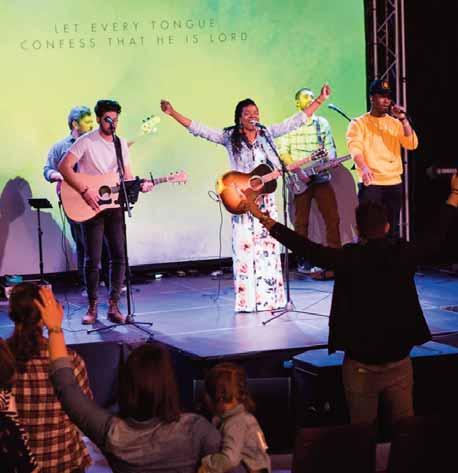
After a couple years of offering summer internships, church staff saw an opportunity to develop a more robust leadership development program, says Shaw, to “train young leaders for vocational ministry in every sphere, whether its accounting to entrepreneurial business leadership, web development to worship—the whole breadth of what can happen in a larger church.”
Lighthouse staff also talked with leaders at other churches, including Mountain View, a USMB church in Fresno, Calif., about their discipleship and leadership training programs.
Currently, the Lighthouse Residency consists of two summer programs and one full-year program.
Lighthouse provides residents in the three-month summer program with housing and a stipend. Full-year residents are provided housing and ministry expenses and required to fundraise; they are treated as full-time staff members during the residency.
In 2019, Christensen participated in the Summer 1 program, which gives residents a chance to test the waters in all different areas of vocational ministry.
“What we do for that first summer is they literally get thrown everything,”
Shaw says. “They’re event planning, they’re learning how to be a part of our finance team, they get up on stage a couple of times and learn some public speaking, they have to learn spiritual formation and discipleship.”
Residents are provided two mentors as they go through the program: vocational mentor, who is usually a Lighthouse staff person, and a spiritual mentor, who is not on staff and provides a safe place for residents to process their thoughts and focus on their spiritual health.
Occasionally, a resident will want to pursue an area of interest that requires partnership with another church.
“Two years ago, we had a resident who really cared about missions,” Shaw says. “We don’t have a director of missions at our church right now, so we utilized Mountain View and connected their missions director with our resident. Twice that summer we flew her out, and she participated in one of their mission trips.”
The Summer 1 program helped Christensen narrow her focus to her areas of passion: assimilation and business.
“By the end of the summer, I understood why God was asking me to go into ministry,” she says. “I really found my passion for connecting people to the church and getting them not only in the church doors but getting them into different groups and connecting them with like-minded people so they can feel loved and supported.”
This year, Christensen is going through the Summer 2 program, which is designed to help residents go deeper in learning the ins and outs of working in their area of interest.
Christensen, who plans to graduate from Colorado Christian in spring of 2022 with degrees in business administration and biblical studies, will learn under the guidance of Megan Budd, director of operations at Lighthouse.
“This summer, now that I know my passions, now that I’ve narrowed it
down, now I get to focus on a little bit of assimilation, quite a bit of communication and a lot of business,” says Christensen.
She hopes to continue on and apply for the full-year residency program after graduation. —Jessica Vix Allen
Three MB podcast hosts reflect on experience
Whether driving to work or working out, people can listen to podcasts just about anywhere. Among the more than 2 million podcasts to choose from are podcasts from U.S. Mennonite Brethren.
The Christian Leader spoke with three MB church staff members with podcasts, including Coalt Robinson, lead pastor at Bethel MB Church in Yale, S.D.; Matt Ehresman, media director at First MB Church in Wichita, Kan.; and Andrew Wuerffel, associate pastor at Zoar MB Church in Inman, Kan., to learn how podcasting has provided a platform through which to share content with their congregations and to hear their advice for others wishing to start a podcast.
Starting a podcast
For Ehresman, who also hosts the USMB podcast LEAD Pods, podcasts provide easy-to-consume content in a busy world.
“What I love about podcasts is it’s a great way to consume information (and) you don’t have to be actively paying attention,” he says. “It’s great for when you’re driving in the car, when you’re on a run (or) when you’re in the kitchen doing dishes.”
At First MB Church (FMBC), Ehresman uploads the audio from lead pastor Brent Warkentin’s weekly sermons to the church’s podcast for those who
might not be physically attending church or who want to re-listen to a specific message.
Meanwhile, for Robinson, who listens to podcasts during his 30-minute commute in rural South Dakota, knowing his own podcast-listening habits helped him recognize an opportunity to serve his local congregation. He and Jay Wipf, a friend and seminary student, started the RenewalCast podcast in 2018, when podcasts were still relatively new, for others who might listen while in the car or on the tractor, with the goal of edifying and building up listeners based on Romans 12:1-2.
For others, like Wuerffel, the coronavirus pandemic prompted a new strategy using a podcast ministry. While unable to meet with his youth group,
Wuerffel started the Trajectory Podcast as a way to provide 10-minute Scripture lessons for students twice a week.
“In some ways I think podcasts (are) the new radio,” Wuerffel says, “I wanted the kids to be able to receive easy to understand Scripture, spiritual information, with the least amount of effort on their part as possible. Oftentimes, I think, especially in high school, you’re so busy. It’s no excuse, but time in the Word is hard.”
While the reasons for starting a podcast are as varied as those who produce them, one thing is certain—it is important to have a plan.
“If you’re going to start a new podcast, you have to have a really clear direction












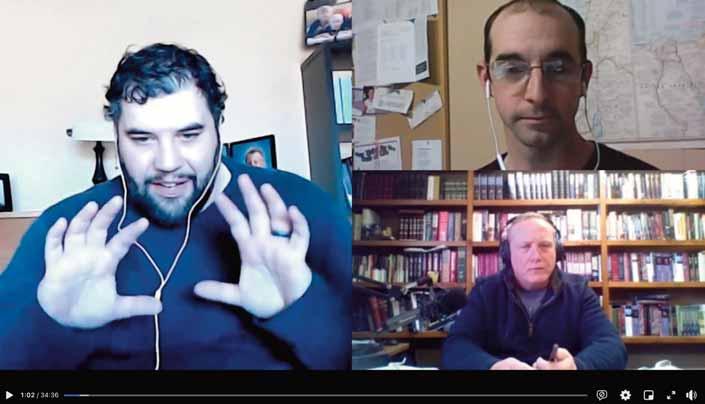
of what you want it to be,” Ehresman says. “Don’t start one just to start one because they’re cool. Because people won’t listen. They’re only going to listen if it’s good.”
FMBC has tried a number of podcasts, including a focused, daily devotional podcast with guided prayer during a church-wide 21 days of prayer and fasting, a seasonal standalone podcast by Warkentin and a year-long Midweek Rewind during which Warkentin and Ehresman recapped the weekly sermon.
The devotional and Warkentin’s podcast were well-received and never intended to be ongoing, although they may be repeated, Ehresman says, adding that Midweek Rewind never caught on.
“We know there’s a ton of upside potential,” he says. “There’s a lot of really
cool things we could do with it, but so far we haven’t really hit the head on what exactly it’s going to look like. We keep trying.”
Robinson, who has recorded more than 115 weekly podcast episodes, agrees it is important to have a clear direction from the start. For Robinson and Wipf, that meant committing to a 12-week book study at the start.
“I think the vision for the future is pretty important,” Robinson says. “If you’re struggling to think of a topic to talk about—what are we going to talk about next week—that gets pretty hard.”
At one point, Robinson says he took two months off to re-evaluate the purpose of the podcast, resulting in a change of format, adding John Goodell, pastor of New Life Fellowship Church, the
USMB congregation in Grant, Neb., to the conversation, adding guest interviews and broadcasting live on Facebook and YouTube in addition to putting an edited version on the podcast.
Wuerffel, meanwhile, started his podcast with a series on the woman at the well and then began working through Jesus’ parables. He now uploads one episode a week.
With the number of podcasts available, a person might wonder if he or she has anything to add to the conversation. But, Ehresman says pastors and staff have a unique opportunity and audience.
“People are increasingly looking for very specific content,” Ehresman says. “They want to hear from their leaders
that they know and they trust—people that they see on Sundays, that they can interact with. There’s kind of an ‘in’ that you don’t get with the big national platforms that everyone’s watching and listening to.”
Robinson has found this to be true. While admitting that if given the chance to do it over again, he may not start his own podcast given the number of quality podcasts, RenewalCast provides an opportunity for his local congregation to hear his perspective on relevant topics.
“Yes, there are people that do it better than us, I’m sure,” Robinson says. “But for our church community and the people that know us, I think they like to hear our perspective on those things.”
At the same time, podcasting can benefit the podcaster.
“Doing a podcast will really sharpen you,” Robinson says. “If you’re going to talk to the world about a subject, you feel the need to be somewhat of an authority on it, at least kind of know what you’re talking about. You don’t want to just make stuff up on the fly, so I think that that’s good for ministry leaders to be exposed to those different things and be forced to study them and to be up on the issues of the time.”
For Wuerffel, podcasting has been fulfilling, allowing him to share what he’s learning and encouraging others to do the same.
“We receive a lot of spiritual content, but we’re not given a lot of opportunities to practice what we learn, so for people like me and people who want to make podcasts, it’s an opportunity to do something with what we’re receiving,” Wuerffel says.
For church leaders who would consider starting a podcast, the three offer practical suggestions. Ehresman encourages churches to start with a practical need and take advantage of what they’re already doing well.
“If you can be known as a voice in your community that can help answer
some of those big questions that we all have, that’s probably the best way to get new people to come to your church or get to know you,” he says. “If you know that your kids’ department is just excellent, take advantage of that, and use the people in your church who are good communicators or good teachers and have them share what they’ve learned, share what they know.”
Wuerffel and Robinson emphasize the importance of having quality equipment. Robinson, who now records podcast episodes via Zoom, says he regrets initially starting by recording his conversations with Wipf at a restaurant.
“One of the things that we learned really fast is that the quality of it will turn people off right away,” he says. “I think it was a really poor decision for us to start



in a restaurant. Don’t start until you’re ready. Do some testing and editing and make sure that your quality’s right.”
While there is a monthly hosting fee, the cost to start a podcast is minimal, so there’s not a lot of risk in trying.
“Getting it out to iTunes and Spotify isn’t that hard, (and) it’s not very expensive,” Ehresman says. “You want to start with a clear goal and know what you want to do, but it’s not a huge risk to try.”
After all, the goal isn’t perfection, according to Ehresman.
“You don’t have to actually go back and edit out every imperfection,” he says. “The best podcasts are the ones where people are just completely transparent and open about whatever they’re talking about.” —Janae Rempel



For the last year, I have been connecting with a group of about six to eight other pastors in a LEAD Cohort for a onehour Zoom call every other week. Our group has a rather enlightened name: Nothing Group. It has an even more portentous goal: to talk about nothing. Despite such lofty aims, being with this group of pastors has been a continual source of genuine joy, generous truth and deep relationship. So, what good is a group about nothing?
Mark 3:14 makes a simple yet profound statement when Jesus called the 12 disciples: “And he appointed 12, whom he also called apostles, to be with him....” Jesus chose them specifically to be with him. In an increasingly divided and divisive world, this with-ness is missing from so much of our lives. Whether because of Covid-19, technology, the pace of life or a myriad of other factors, it seems less and less of our lives are spent with one another.
Not only that, but we continue to see deep fractures within our society and yes, even some fissures within our own denominational family. Communities have increasingly become tribalistic, wherein people are no longer looked upon as individuals but rather avatars of monolithic groups. How do we as peacemakers, called to the ministry of reconciliation, begin to mend those cracks?
It is this with-ness that is key. Yes, like our Lord and Savior, we must come with grace and truth (John 1:14), but we must be with people in order to do that. It is with people that our heart is moved to gracious compassion just as Emmanuel’s was when he came to be with us. It is only with people that we garner the courage, privilege and empathy to speak truth into another person’s life. It is only in this withness that we fulfill our mission of making followers of Jesus Christ.
What does this all have to do with a group of pastors who get together to talk about nothing? Well, we get together for nothing other than to be with one another.
There is not much we have in common, except that we are each with Christ and therefore with one another. This kind of commitment is sorely lacking in so many of our relationships.
Colossians 3:12-15 says, “Put on then, as God’s chosen ones, holy and beloved, compassionate hearts, kindness, humility, meekness and patience, bearing with one another and, if one has a complaint against another, forgiving each other; as the Lord has forgiven you, so you also must forgive. And above all these put on love, which binds everything together in perfect harmony. And let the peace of Christ rule in your hearts, to which indeed you were called in one body.”
While Paul was writing to the church at Colossae, it equally applies to all Christian relationships. The text lends itself to the reality of Christian relationships as if the Bible knows what being human is really like. If we are going to have any meaningful relationship with one another that means there is going to be offense, disagreement and misunderstanding. In those spaces, we must figure out how to forgive one another and bear with one another. Groups such as the Nothing Group foster these deep, restorative relationships.
To get together with a group of fellow pastors and talk about nothing with one another is binding. As a young pastor, having fellow pastors that I can strive with together for the Lord’s kingdom is rejuvenating. To know that they neither want nor expect anything from me other than to walk together towards Jesus is freeing.
There are two “Nothing Group” cohorts for pastors in addition to several other LEAD Cohorts covering a wide variety of issues/topics/needs that are offered to all Mennonite Brethren, not just pastors. USMB provides these cohorts for the purpose of connection and relationship-building. A new lineup of LEAD cohorts will be offered in early September. Be watching for details about how to sign up.◗

LeViere is pastor of Good News Fellowship, Ferndale, Wash. He previously served as a pastoral intern and worked as program director at Cascade Connections, a nonprofit ministry in Lynden, Wash., that serves people with disabilities. He and his wife, Jen, have four children.
The view from my window is a reason to hope
After13 months of working from home during the coronavirus pandemic, I returned to my upstairs office in the century-old house that serves as a center for the day-to-day work of Fresno Pacific Biblical Seminary. It is a grand old building, a little shabby but well-used by generations of faculty and staff working with students preparing for pastoral work, missions, teaching and service in the fields of counseling and community development.
The seminary joined forces with Fresno Pacific University in 2010, a move that opened our small corner campus to new activity. These days, my upstairs office is giving me a terrific vantage point from which to watch the growth of FPU’s new Warkentine Culture and Arts Center (CAC) that is being built next to the Seminary House. It is a fine juxtaposition of old and new and we anticipate both buildings serving well into the future.
The CAC is designed to be a flexible space able to host everything from concerts and plays to lectures and worship services.
The grand foyer will be able to serve as a gathering space for dinners and other celebratory events. The building is meant to serve both the FPU community and our neighborhood, and it is made possible by a host of small gifts together with the generosity of people such as Al and Dotty Warkentine, long-time supporters of the work and mission of Fresno Pacific.
Visitors to my office are likely to find me pushing them toward the windows. “See how it grows!” I want to tell them. And while there are days that I find the construction noise a serious distraction to the work I am supposed to be doing, I am also aware of how good it is to see something growing. The building taking shape outside my window has become a tangible symbol of hope.
The Bible is infused with a message of hope. We hope in God’s goodness, God’s provision and especially God’s ultimate
saving work in the life, death and resurrection of Jesus Christ. We proclaim that God is at work and will one day restore all things to God’s glory. In the in-between time, however, we are left dealing with the very real consequences of sin in the world. It manifests itself in broken relationships; it holds us in bondage to destructive habits. It turns us away from, as our USMB Confession of Faith puts it, “holiness, justice and righteousness.”
A new building, of course, doesn’t repair that brokenness. It can, however, serve as a launching pad for engagement with a world in deep need of God’s hope and healing. The physical spaces we build and occupy can be used to welcome people into the Christian community.
Recently, the seminary and university have been working hard to enlarge the ways we engage with the community around us. While teaching and preparing leaders for the church and the world is at the center of our work, we’ve also been able to imagine new ways of engagement.
Through a generous grant from the Lilly Endowment, our Center for Community Transformation is resourcing local congregations and pastors to help them develop ministries that serve the physical, social and spiritual needs of their communities. Through our Center for Anabaptist Studies, we host webinars for USMB pastors and denominational leaders to gather and learn about timely issues. Our OnSite Counseling Center is offering mental health services through contracts with local schools, Christian nonprofit organizations and even a large farming operation. These things also represent hope as we engage with the world around us.
May God continue to nurture our imaginations for ministry and service in the various places we occupy so that we may point to the signs of God’s kingdom and say, “See how it grows!”◗
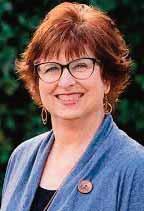
Valerie Rempel serves as dean of Fresno Pacific Biblical Seminary and vice president of Fresno Pacific University in Fresno, California. She has degrees from Tabor College, MB Biblical Seminary and Vanderbilt University, and she has served on a variety of Mennonite Brethren and inter-Mennonite boards.
Logan Schafer, Ann Pierce, Tonya Rodgers, Aubree Rodgers, Alec Dookhran, David Remley, PaulaJean Cartwright, Casondra Barreras, Mark Huebner, Robyn Parker, Brielle Rawson, Joshua Kinser, Zoe Houston, Piper Houston, Kolby Klenik and Britney Pantoja were baptized at South Mountain Community Church, St. George (Utah) Campus, May 23.
Glen Averill, Sean Averill, Jered Jerome, Jill Jerome, Josh Lewis, MJ Lewis, Josh Lockrow, Dawn Lockrow, John Prieb and Annabel Prieb were received as members at Community Bible Church, Olathe, Kan., May 23.
Stephanie Morse, Ellen Jones, Sawyer Peacock and Kenna Peacock were baptized at South Mountain Community Church, Lehi (Utah) Campus, May 16.
Tori Greb, Sadie Ratzlaff, Jay Decker and Christie Decker were received as members at New Hopedale Church, Meno, Okla
Lincoln Keller, Rylynn Keller and Vicki Greenbush were baptized at Redemption Church, Owatonna, Minn., May 16. Dean Stricklin, Dar Stricklin, Nick Graupmann and Natalie Graupmann were received as members, May 9.
Jennifer Davidson was received as a member at Parkview MB Church, Hillsboro, Kan., May 16. Emily Dickinson was baptized and received as a member April 25. Wyatt Dickinson was also received as a member.
Eva Smith and Ashley Ramirez were baptized at South Mountain Community Church, South Jordan (Utah) Campus, April 4.
Guadalupe Munoz and Kaiani Hiebert were baptized at Heritage Bible Church, Bakersfield, Calif., March 7.
Seven people were received Feb. 7 as members at Enid (Okla.) MB Church, now Crosspoint Church.
Clayton Paull was installed June 6 as lead pastor at Hope Kingsburg (Calif.)
Joe Skillen began serving as teaching and discipleship pastor at First MB Church, Wichita, Kan.
Adam Johns concluded his service as youth ministry leader at Community Bible Church, Olathe, Kan., May 23.
Dalke, Ruby Louise, Hillsboro, Kan., of Good News Christian Fellowship, Marion, Kan., Nov. 17, 1938—Jan. 19, 2021. Parents: Pete and Katherine (Loewen) Koslowsky. Spouse: Warren Dalke. Children: Marty, Bonnie Hein; six grandchildren, two great-grandchildren.
Enns, William “Bill,” Fresno, Calif., member of Reedley (Calif.) MB Church, April 27, 1947— May 23, 2021. Parents: Henry and Susie (Gerbrandt) Enns. Spouse: Rhoda Enns. Children: Stacey Reese, Jeremy; two grandchildren. Ewald, Jerry Merle, Madera, Calif., member of Madera (Calif.) Avenue Bible Church, March 6, 1942—March 28, 2021. Parents: Merle and Helen (Miller) Ewald. Spouse: Terri. Children: Deanna Dabbs, Brandon Duran, Carrie (deceased); three grandchildren, one greatgrandchild.
Friesen, Andy W., Wichita, Kan., member of First MB Church, Wichita, Nov. 20, 1935— April 17, 2021. Parents: Jesse and Lydia (Wiens) Friesen. Spouse: Bonnie (Harder) Friesen. Children: Christy Jewell, Shelley Funk; two grandchildren, five great-grandchildren.
Friesen, Rozella Mae, Reedley, Calif., member of Reedley MB Church, Nov. 30, 1921— April 22, 2021. Parents: Peter and Goldie Fast Ratzlaff. Spouse: Edwin Friesen (deceased). Children: Carol Ediger, Dennis, Loren, Patti Heinrichs, Sandy Penner; 12 grandchildren, 28 great-grandchildren.
Goentzel, Charles, Wichita, Kan., member of First MB Church, Wichita, Oct. 29, 1949—Jan.
24, 2021. Parents: Leo and Margaret Goentzel. Spouse: Sandra (Wall) Goentzel. Children: Stacey Sharp, Christy, Brian; six grandchildren.
Martens, Adam Walter, Fairview, Okla., member of Fairview MB Church, Sept. 8, 1977—May 14, 2021. Parents: Trent and Sheri Martens. Spouse: Nicole Hasty. Children: Sydney, Reed.
Martens, Marvin, Fairview, Okla., member of Fairview MB Church, March 28, 1933—May 10, 2021. Parents: Albert and Minnie Martens. Spouse: Jeanette. Children: Marva Morris, Brad; four grandchildren, 10 great-grandchildren.
Myers, Gary L., McPherson, Kan., member of Hillsboro (Kan.) MB Church, June 25, 1945— April 10, 2021. Parents: Glenn L. and Dorothy (McDaniel) Myers. Spouse: Dianne Wiselogel. Children: Grant, Aaron, Lisa Schmidt; eight grandchildren.
Schapansky, Dorothy, Reedley, Calif., member of Reedley MB Church, July 12, 1930— May 10, 2021. Parents: P.R. and Susan (Reimer) Lange. Spouse: Dale Schapansky. Children: Greg, Denise Derksen, David; eight grandchildren, five great-grandchildren.
Warkentin, Larry, Fresno, Calif., member of North Fresno Church, Aug. 14, 1940—April 5, 2021. Parents: Pete and Marie Warkentin. Spouse: Paula (Berg) Warkentin. Children: Richard, Rhonda Langley; two grandchildren.
Wichert, Robert Lee, Fairview, Okla., member of Fairview MB Church, Feb. 26, 1937— May 20, 2021. Parents: Emil and Lena Wichert. Spouse: Elizabeth Suderman. Children: Trevor, Amber Maxey, April Wall; seven grandchildren.
Woelper, Katharine “Kathie,” Reedley, Calif., member of Reedley MB Church, June 22, 1939—April 4, 2021. Parents: John and Kay Buckley Woollett. Spouse: Peter Woelper (deceased). Step-children: Peter, Eric; six stepgrandchildren.
Women from Faith Bible Church, Omaha, Neb., visited Lauritzen Gardens followed by a picnic meal.
The Cross Timbers Church, Edmond, Okla., congregation held an all-church party May 26 with a carnival theme evening including inflatables, games and food.
The Buhler (Kan.) MB Church congregation held a “backyard bash” with a picnic and games following the May 23 worship service and group meetings.
The Women’s Ministries at Rosedale Bible Church, Bakersfield, Calif., hosted a kickoff
picnic May 15. The congregation gave a flower to mothers on Mother’s Day and also provided an opportunity for family photos. The congregation held Family Day May 2, a service geared toward families in which children performed songs, followed by a meal, games and crafts.
Hope Kingsburg (Calif.) celebrated Children’s Day May 16 with a service in the park, worship with an African drumming team and barbecue lunch.
Axiom Church, Peoria, Ariz., celebrated Mother’s Day May 9 by giving free Driftwood coffee to all moms. In an effort to gather together, the church held dinner parties hosted by someone in the community with discussion around a chosen theme or topic. The May 14 dinner party topic was “Grief as worship.”
Enid (Okla.) MB Church has changed its name to Crosspoint Church following a membership vote in late April.
Lead pastor Asher Griffin says the congregation desires to be consumed by and promote the gospel, and the name had become a barrier to that mission in conversation.
North Fresno (Calif.) Church hosted the “Cherry on Top” ice cream truck in its parking lot April 21.
The congregation at New Hopedale Church, Meno, Okla., held an Easter sunrise service and brunch April 4. The congregation hosted the Corn Bible Academy choir in concert March 7.
Buhler (Kan.) MB Church held a hymn sing May 2.
Hillsboro (Kan.) MB Church held a hymn sing April 18.
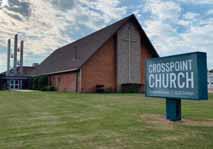
“We’re a group of Christians who want to be known by nothing other than Christ and him crucified,” Griffin says. “We continually saw that our name was not immediately communicating to people the God we worship, our King who saves and his church as an embassy of heaven in a lost world. For about a year, members kept coming to me and bringing up the subject of their evangelizing or inviting people to church and how our name was an immediate conversation stopper and barrier to people coming through our doors.”
Discussion surrounding a name change began among church elders in fall 2020. Elders held conversations with individuals over the winter before presenting a name change proposal for membership vote on March 27. Members voted to affirm the name change, and after seeking input from members, church elders proposed three names on April 12. Members voted to select the new name on April 25.
“We were encouraged by the overwhelming number of positive votes to change the name and select a new name,” Griffin says. “The Lord has provided an incredible amount of joy and unity in Christ during this season.”
Griffin says the hope is the new name represents the church’s desire to point themselves and others to the cross of Jesus.
“We aim to be known as a church who cherishes the gospel, loves people and lives on mission for God’s glory,” Griffin says. — Janae Rempel
Mountain View Church, Fresno, Calif., celebrated its 27th anniversary May 2 with free tri-tip sandwiches across all campuses. Mountain View Church, East Campus, Fresno, Calif., held its grand opening June 6.
Hillsboro (Kan.) MB Church celebrated its 140th anniversary, April 25, with a portion of the service dedicated to an overview of church history.
The women’s ministry at Salem MB Church, Freeman, S.D., coordinated a card shower for members of the congregation living in long-term care facilities or with assistance.
People from Cornerstone Community Church, Topeka, Kan., filled baby bottles with spare change for a Lifeline Pregnancy Center fundraiser.
The women’s Thursday morning Bible study group at Cross Timbers Church, Edmond, Okla.,
collected gently used shoes May 9-23 to be delivered to McAllen, Texas, and taken to the border for immigrants needing shoes.
Zoar MB Church, Inman, Kan., partnered with the McPherson Housing Coalition to repair two houses as part of the church’s annual serve week May 26-29. Volunteers painted two houses and did yard and trash cleanup, while others helped make meals for the week.
People from The Bridge Bible Church, Bakersfield, Calif., served Hume Lake Christian Camps May 14-16 by building, cleaning and refurbishing.
Local Church
Associate Pastor of Worship/Adult Discipleship: North Oak Community Church in Hays, Kan., is seeking a full-time associate pastor of worship and adult discipleship. The position is part of a collaborative ministry team and will be responsible for overseeing the weekly corporate worship services, leading the music ministry, providing leadership for adult ministries including small groups and supporting other pastoral needs. Qualified candidates will be mature believers willing to become licensed or ordained for ministry. More information on the position can be found at https://www.northoak.net/associate-pastor-search/. To apply, please submit a cover letter and resume to pastorsearch@northoak.net.
Tour
Next year in Jerusalem! Join Pastor Brian Wiebe and a group from Bethany Church Fresno on a “Best of Israel” Tour, March 18-28, 2022. Your Bible will be alive and in color once you’ve walked where Jesus walked and prayed where Elijah prayed. For details, visit pilgrimtours.com/groups/bethanychurchfresno2021.htm; email Brian@BethanyChurchFresno.com
Resources
LEAD Pods are the official USMB podcast devoted to leadership development and spiritual growth. This is Mennonite Brethren sharing ideas with other Mennonite Brethren—and beyond. It’s the best of us to the rest of us. List on Apple, Android or Spotify or by visiting the USMB website, https://usmb.org/lead-pods/
C-Link is the CL’s free e-news digest published every two weeks. Receive news from USMB, local church news stories and updates from U.S. Mennonite Brethren ministries. Subscribe at www.christianleadermag.com Visit https://christianleadermag.com/classifieds/ for additional job openings.
From TESTIMONY, page 9
I believe that God accepts lament as true worship when it comes from one whose face is turned toward God and the complaint is brought to God. If lament is worship, I can tell you this: Gladys and I have been worshipping a great deal. God uses people to reveal himself to us, not those who come with well-meaning solutions, but people who simply say, I don’t understand but I will walk with you.”◗
God wants us to have a fiery faith
“Bestrong, and let your heart take courage, all you who wait for the Lord!” Psalm 31:24 (ESV).
What does it mean to “let your heart take courage”? It means letting go of what you think you can or can’t do (or what others have told you you can or can’t do), who you were and maybe even who you are afraid to be and allowing your heart—your true self—to become courageous and strong. To take courage to fully trust God for the future and for providing what you need going forward. I confess there have been numerous times in my life when this has been difficult to do. When things are out of sorts or just plain painful, it’s a real challenge to take heart. Even though the LORD has time and time again provided answers or orchestrated things so that lifepain is eased or even alleviated, I’ve too often been fearful, sad or even mad rather than strong and courageous.
The Bible often mentions our hearts. It refers to the innermost part of who we are. Our soul, our self, our makeup. Our hearts have been challenged way beyond normal over the past year and a half. We’re now emerging out of the COVID-19 dominated way of living and are perhaps, just perhaps, entering into a time of restoration. What (or who) we depend on for providing us with true rejuvenation is the question we must face. Are we simply renewed because restrictions are lifted? Are we revitalized because we can now go places and do things we missed doing? Or are we renewed (made strong) because we have waited upon the Lord and our hearts have become stronger in him? He has seen us through. He provided a way. He lifted us up time and time again.
If COVID-19 hasn’t resulted in lifelong lessons about trusting God and taking courage in him, then we have missed
a critical opportunity for deep spiritual growth. As believers, we should be releasing from the cocoon of this pandemic with new vitality founded upon knowing that God has lovingly brought us through one of the most dynamically painful times in world history. But true renewal will ultimately come through wholly realizing that we need Jesus to refresh our souls. We need to allow him to restore heartfelt courage. I recently spent a couple of days in a prayer retreat. It was a good time to simply be with Jesus so that he could speak into my soul. It was a time of being in his Word and letting those verses sink in. But it wasn’t enough, I need even more of that. My wife, Janna, is studying Elijah’s walk with God through a Priscilla Shirer book. Janna’s spending hours each week allowing the Lord to enrich her faith through these lessons. As the promo for the curriculum says, to “journey through the life and times of the prophet Elijah to discover how the fire on Mount Carmel was forged in the valley of famine. And how the emboldened, fiery faith you desire is being fashioned by God in your life right now.” Emboldened. Fiery. Faith. Fashioned. We as God’s people need this. We need this now! Now is the time for rekindled fiery faith—hearts that have taken courage. The world needs us to have this kind of faith. It’s this kind of faith that does whatever it takes to bring the message of salvation and redemption to the broken, faithless, godless, strife-filled planet in which we live. The lull, the drudgery of COVID-19 is ending. The time for passionate spiritual warfare on behalf of the many who are currently being lost in the battle is now. By means of those whose hearts are strong and courageous.◗

Don Morris began serving as the USMB national director Aug. 1, 2016. Prior to accepting this new position, Morris served as the USMB interim executive director for two years and as the director of Mission USA since 2004. He and his wife, Janna, live in Edmond, Okla., where they attend Cross Timbers Church.

































